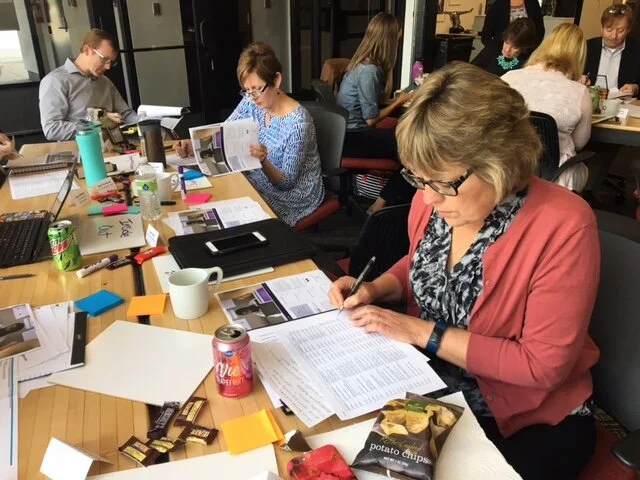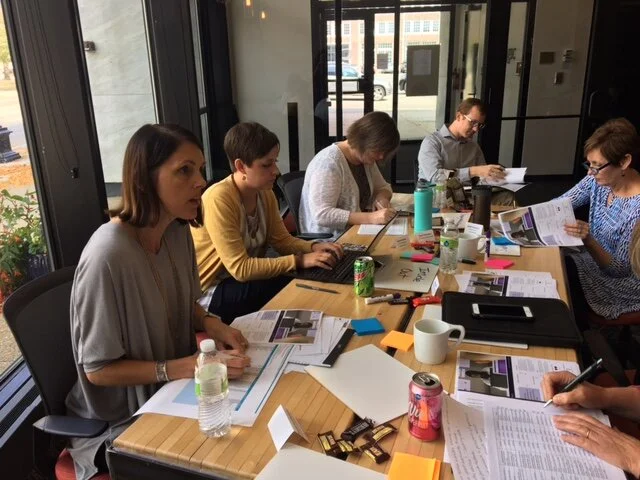Getting Diversity, Equity and Inclusion Off the Sidelines and into the Center of Our Work.
When we think about addressing diversity, equity and inclusion (DEI) in our organizations, we tend to jump to the tactical response of training. Training, such as unconscious bias training, is extremely important. However, if we stop there, we might not make lasting or holistic change. Consider, what happens, when we move DEI to the center of the conversation and consider in what ways we need to strengthen, adjust and change all of the ways we work from staffing to planning to partnerships and systems.
When thinking about addressing challenges at the center of our work, See What I Mean often uses a tool called Success Circle.
Read More
HELP! What do I do with my strategic plan now? 3 choices
Over the last five years, we’ve seen experts implore organizations to stop strategic planning. The rationale goes… “the world is too unpredictable for long term planning.” Hello 2020! If there was ever a moment to call unpredictable, it’s this one! We’ve never boarded the “stop planning” bandwagon, and we are not going to start now.
Why keep planning?
Read More
Prototyping During Disruption
At See What I Mean, we believe that prototyping plays an integral role in how we think about moving forward with any strategy. However, we also find that the skill of prototyping is one we have to do over and over again in order to engrain it into our standard practices.
Read More
Thriving in Disruption
Plan, Act, and Communicate on Multiple Timelines!
Two of the greatest surprises about Thriving in Disruption are:
Read More
Planning During Disruption 2.0
When our current strategies run into disruption we must make choices.
Even during disruption, we have the opportunity to act with intention. Use this model to consider the long-term effects, opportunities and side effects of today’s choices.
Read More
Virtual Meetings That Feel Real Are Possible
I was recently in a Zoom meeting and a participant said, “ I don’t know about you all, but when I am in these meetings it is hard for me to believe it is actually real.”
They were talking about the lack of human interaction, but I often have the same thought about virtual meetings when it feels like anything I say just disappears into the ether. I don’t see anyone writing it down, putting it on a
Read More
8 Questions to Build Your Virtual Confidence
Today, many of us are scrambling to find virtual tools for meetings, classes, or to simply stay connected. In response, we've accelerated experimentation with new virtual tools and had to become more systematic to gain confidence to use them with clients.
Read More
Will Social Distancing Disrupt the Hard-Won Collaboration Culture of the Social Sector?
A recent Slate article proposed that the changes we are making to fight COVID-19 will likely mean that we will NOT go back to the “way life was before.” (We’re Not Going Back to the Way Life Was Before, March 12, 2020, Henry Grabar))
In one week in the United States we have accomplished the nearly universal acceptance of social distancing as an effective way to “flatten the curve” and slow down the spread of the virus.
Read More
Planning during Disruption
Last week, in the midst of making cascading decisions to keep people safe, a client encouraged us to help them find ways to continue planning for the future. Even when their daily work had become exclusively focused on TODAY’S work they were committed to the LONG TERM. It was an important lesson for See What I Mean about leadership, planning and disruption.
Read More
Virtual Meeting Checklist
We are working on a lot of large and small Virtual Meetings these days, and nothing is worse than holding the time on the calendar and then wasting the time due to technical difficulties. Fortunately, our team has over a decade of telecommuting under our belts, and a wide array of knowledge in over-preparing for meetings.
Read More
10 Tips for Better Virtual Meetings
This week has been a scramble for many of our clients who are canceling in-person meetings as a proactive risk reduction strategy in response to the COVID-19 virus. This isn’t a bad idea, in fact as The Atlantic stated in their byline of the article Cancel Everything, “ Social distancing is the only way to stop the coronavirus. We must start immediately.”
But Wait!
Don’t remove the meeting from your calendar just yet.
Read More
Who Is SWIM?
As a college student, I have had the opportunity to learn a lot, but I’m trying to figure out how to apply that learning in the real world. Getting the job at See What I Mean has felt like jumping into the deep end of learning how to apply those lessons.
Read More
Inside Out Values
I bought a new pair of jeans with very explicit laundry instructions to turn them inside out for washing in order to preserve their full color and quality on the outside.
Read More
Open The Door On Your Strategic Planning Process
Currently, my kids are obsessed with the Hamilton soundtrack. After I had the chance to see the play in Chicago, and it lived up to all the hype, I turned on the soundtrack in the car and my son can’t get enough. One song he always asks to play is The Room Where it Happens.
Read More
Ask for Advice + 9 more Tips for Great Advisory Boards.
During one stretch a few years ago, I found myself on 6 Advisory Boards. I love the idea of Advisory Boards — that’s probably why I kept saying yes! You get to be “in the know” of an organization you care about and you get to share some expertise to help. At least that’s what I thought I was going to do when I joined an Advisory Board. Sadly, many Advisory Boards don’t know how to make the most of the of their Advisory Board members. During one particularly long, painful and boring Advisory Board experience I scribbled down some tips of how we can do better. (And, by “we” I mean me included, because I’ve made my fair share of these mistakes during my tenure!)
Read More
Finding the Courage to Fundraise
Anyone who cares about a “cause” will do some fundraising at some point. It is inevitable. And most people who give also report that they also fundraise for the things they believe in. But many of us will agree to do fundraising “kicking and screaming” mostly because we feel unprepared and therefore insecure about the task.
But regardless of how we feel about fundraising, nonprofits—large and small—depend on their staff and volunteers to muster their courage every day to ask others to support their cause.
Read More
Be Thankful For This Network Challenge
Tis’ the season to be THANKFUL.
Thankful for our families, our friends, our health, and so on. And in this season of thankfulness, I’m reflecting on one of the biggest network challenges we face today.The challenge is the enormous number of people and organizations wanting to do good. This bounty, if not effectively connected, can make it difficult to impact the world's wickedest problems.
Read More
Never Put Down Your Strategic Plan.
Sometimes the mistakes we make are our best teacher. Such is the case with my pursuit of a better way of helping organizations to use their strategic plans.
The mistake that I kept repeating: After hours of work with clients we would produce a beautiful strategic plan! Then, after hand-offs and hugs I would walk away, leaving the talented people at the organization to get to work.
Read More
Innovating with Empathy
Over two years, 23 grantmakers explored how to improve openness and transparency. The grantseekers we learned from made the best case for improving our practices.
“Philanthropy gains impact and trust with grantseekers when funders practice openness. Grantseekers are able to get a stronger sense of the priorities of the funder when there is openness in the relationship.” Gina Weekley - At-Risk Student Supports Coordinator, Waterloo Community School District
Read More
The Six Principles of Great Meetings
Some days we feel like meetings gobble us up. We beg to get back to our desk to do our “real work.” Other days we need an idea, a decision, a breakthrough and our first instinct is to call a meeting for help.
Why are meetings so tricky? Why are we so ambivalent about them? At See What I Mean, we believe meetings are necessary because so much of what we try to accomplish requires human interaction.
Read More




















